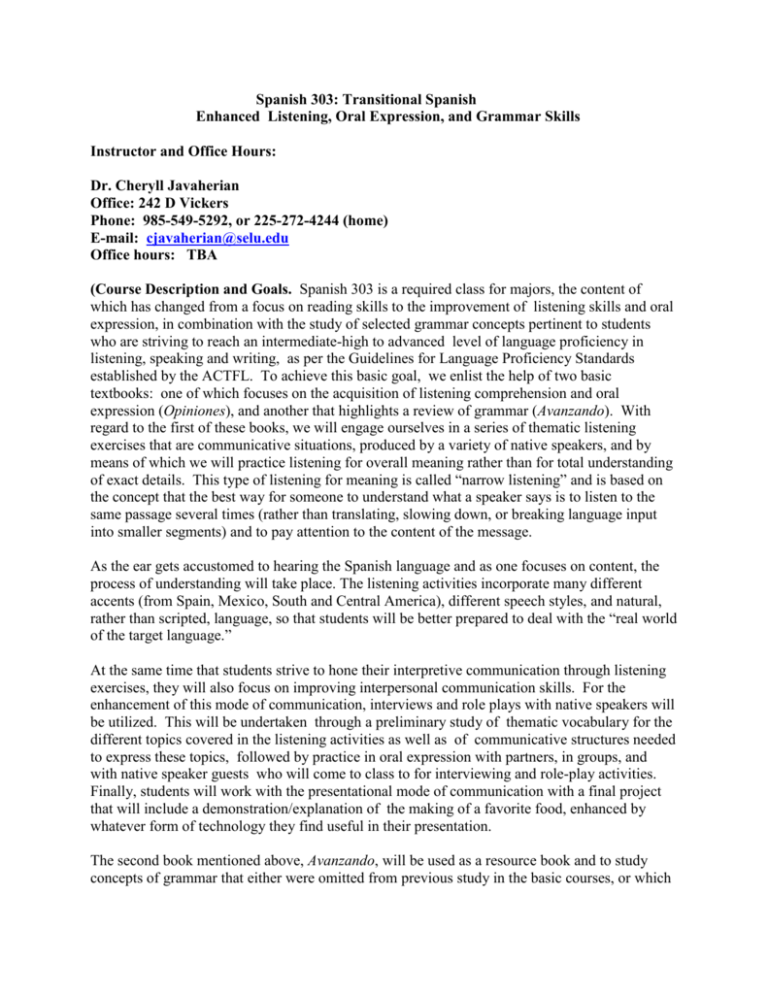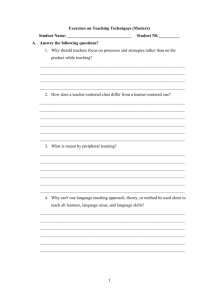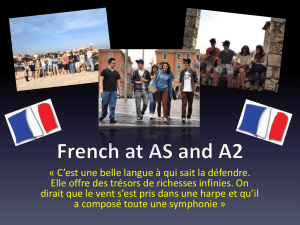
Spanish 303: Transitional Spanish
Enhanced Listening, Oral Expression, and Grammar Skills
Instructor and Office Hours:
Dr. Cheryll Javaherian
Office: 242 D Vickers
Phone: 985-549-5292, or 225-272-4244 (home)
E-mail: cjavaherian@selu.edu
Office hours: TBA
(Course Description and Goals. Spanish 303 is a required class for majors, the content of
which has changed from a focus on reading skills to the improvement of listening skills and oral
expression, in combination with the study of selected grammar concepts pertinent to students
who are striving to reach an intermediate-high to advanced level of language proficiency in
listening, speaking and writing, as per the Guidelines for Language Proficiency Standards
established by the ACTFL. To achieve this basic goal, we enlist the help of two basic
textbooks: one of which focuses on the acquisition of listening comprehension and oral
expression (Opiniones), and another that highlights a review of grammar (Avanzando). With
regard to the first of these books, we will engage ourselves in a series of thematic listening
exercises that are communicative situations, produced by a variety of native speakers, and by
means of which we will practice listening for overall meaning rather than for total understanding
of exact details. This type of listening for meaning is called “narrow listening” and is based on
the concept that the best way for someone to understand what a speaker says is to listen to the
same passage several times (rather than translating, slowing down, or breaking language input
into smaller segments) and to pay attention to the content of the message.
As the ear gets accustomed to hearing the Spanish language and as one focuses on content, the
process of understanding will take place. The listening activities incorporate many different
accents (from Spain, Mexico, South and Central America), different speech styles, and natural,
rather than scripted, language, so that students will be better prepared to deal with the “real world
of the target language.”
At the same time that students strive to hone their interpretive communication through listening
exercises, they will also focus on improving interpersonal communication skills. For the
enhancement of this mode of communication, interviews and role plays with native speakers will
be utilized. This will be undertaken through a preliminary study of thematic vocabulary for the
different topics covered in the listening activities as well as of communicative structures needed
to express these topics, followed by practice in oral expression with partners, in groups, and
with native speaker guests who will come to class to for interviewing and role-play activities.
Finally, students will work with the presentational mode of communication with a final project
that will include a demonstration/explanation of the making of a favorite food, enhanced by
whatever form of technology they find useful in their presentation.
The second book mentioned above, Avanzando, will be used as a resource book and to study
concepts of grammar that either were omitted from previous study in the basic courses, or which
need some refinement. Assignments will be made from this book, based on need, as we progress
through the listening exercises.
For Education majors in this class, a maximum of 10 hours of field experience may be earned.
Dr. Heloise Aucoin, Director of Field Experience in Education, will assist in placement of
students during the 1st few weeks of classes. Education students who receive credit for the 10
hours of field experience will present a completed Form C, with a reflection journal (a sample
and guidelines will be provided) for each hour of observation made. A departmental rubric
should also be filled out, together with the C Form, as it specifically addresses standards and best
practices in foreign language teaching, as laid out by the latest update of Louisiana Standards for
the Teaching of World Languages. It is advised that students divide up the hours for observation
between at least two schools, unless the student is helping out with a semester-long project, such
as conversation sessions or tutoring, at an approved observation site. It is also advised that
candidates seek such hands-on situations in the possible sites for observation. Candidates will
turn in for checking their observation forms and reflection journals twice during the semester (at
mid-term) and during the final week of classes. For the oral presentation part of the final, in lieu
of following the topic assigned for the oral presentation required of the non-Education
candidates, Education candidates will give an overview, assisted by a Power Point presentation
(in Spanish) of their experiences in the field. The listening-comprehension, and grammar
portions of the final will be the same for Education and for Non-Education track students.
Textbooks and Audio Program:
1. Opiniones: A Four-Skills Approach to High Intermediate/Advanced Spanish. Victoria
Rodrigo, Francisco Lluna-Mateu, Carmen Schlig. New Jersey: Pearson/Prentice-Hall, 2005.
The book is under the rental system, but the Audio Program is not; it must be purchased, and it
must be acquired through the University bookstore, the publisher (Pearson/Prentice Hall), or
through Amazon.com. The latter may have some used copies of the CDs, but the publisher has
indicated that their price is a little less than that of the bookstore, and they also offer a 10%
discount and free shipping if you open an account. The university bookstore has the CDs (a set
of 3) for sale for $50.50. If you opt to buy from the publisher, the CDs will arrive within
approximately one week. To do so, go to www.MyPearsonStore.com , fill in the last name of the
author (Rodrigo), click on the book (Opiniones), then click on “And Everything That Goes with
It”. Its price is listed as $48.60. Next click on “Add to Cart.” You will get free ground
shipping, and if you sign up (that is, “create an account”), you earn a 10% discount. Everyone
should have somehow acquired or purchased these CDs by August 28.
2. Avanzando: gramática española y lectura, 6th edition. Sara L. de la Vega and Carmen
Salazar. Hoboken, New Jersey: John Wiley & Sons, 2007. This book is also in the rental
system.
Recommended:
Spanish/English Dictionary: AMSCO, Vox, Larousse, Collins,
University of Chicago, Oxford
Evaluation: Final course grades will be given based on the following point scale.
Grades will be given for the following:
7 homework assignments @ 15 points each, one of which is dropped
90
4 listening comprehension quizzes @ 30 points each,
one of which will be dropped
90
3 conversation/oral expression assessments, based on native-speaker
interviews and role-play activities @ 30 points each (none dropped)
90
2 grammar quizzes @ 40 points each (none dropped)
80
1 final exam including grammar-based study, listening comprehension, and oral
expression @ 100 points
100
Grand total of points possible:
450
Grade ranges by 10% scale;
405-450 = A
359-404 = B
313-358 = C
267-312 = D
0-266 = F
Attendance & Participation: Successful progress in a language course requires that students
keep up with assigned material. For this reason, attendance is carefully noted.
There are no make-ups for homework assignments or missed quizzes, even with an excused
absence (with the exception of an Administrative excuse signed by the University
Administration [Provost’s Office] for a sports event or debate field trip, and the like, and
Military assignment to active duty). This is why you will be allowed to drop one homework
and one quiz grade. If you miss a conversation/oral expression assessment (for which there
is no assignment dropped), an excused absence will be the reason for allowing a make-up.
Excused absences consist of the following: 1. administrative excuse (you are participating in a
school activity which has been excused by the university administration); 2. valid medical
excuse signed by a doctor or infirmary staff; 3. jury duty; 4. military duty; 5. death in the
immediate family. If no written proof (subject to verification by the instructor) is offered in all of
these instances of absence, it will be assumed that any given absence is “unexcused.” You must
bring your valid documentation with you when you return to class in order to schedule a missed
oral evaluation.
Homework: is any activity assigned by the instructor to be prepared out of class. Assignments
should be completed prior to coming to class. You may not turn in any homework or other
assignment via e-mail if you were not (or will not be) in class when it was (is) due, unless given
permission to do so by the instructor.
E-mail Communication: Students may e-mail their instructors at their official SLU web site
address. Only official Southeastern e-mail addresses will be used, per University policy.
Classroom Behavior: Respectful behavior is expected. Any kind of classroom behavior that
interferes with either the instructor’s ability to conduct the class or the ability of students to
benefit from instruction is unacceptable. Examples include bringing children or other family
members to class for day care or babysitting, use of beepers, cellular phones or other electronic
devices; routinely entering class late or departing early; reading newspapers/working crossword
puzzles; unauthorized talking that is of a disruptive nature; behavior that crosses the line of
civility. Classroom behavior which is deemed inappropriate and cannot be resolved by the
student and the faculty member may be referred to the Office of Judicial Affairs for
administrative or disciplinary review as per the “Code of Student Conduct” which may be found
at http://www.selu.edu/StudentAffairs/Handbook/.
Academic Integrity: Cheating on examinations is considered a very serious offense and will be
grounds for disciplinary action as described in the current General Catalogue. During any type
of examination, students may not leave to go to the bathroom or elsewhere, wear bill caps turned
to the front, leave opened backpacks on the floor, have cell phones or other electronic devices on
their desks (or in their ears, concealed under caps or scarves), and have paper other than their
tests on the desks, unless instructed to do so by the teacher.
Students with Disabilities: If you are a qualified student with a disability seeking
accommodation under the Americans with Disabilities Act, you are required to self-identify with
the Office of Student Life, Room 203, Student Union. Required paperwork must be
submitted to your instructor before any accommodations are made.
Important Dates to Remember:
Last date to drop the course:
Textbook is due back to rental office by this date, or a fee will be charged:







